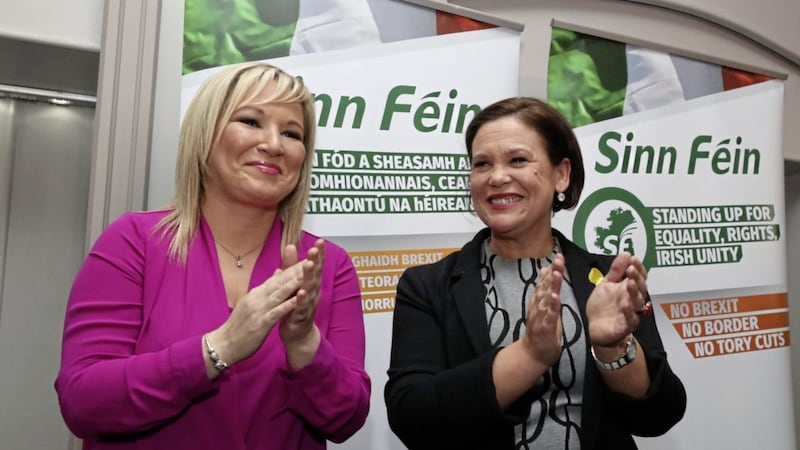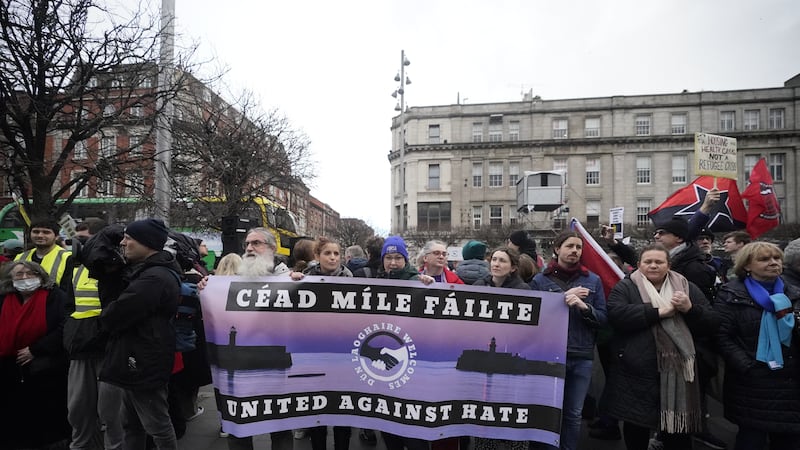SINN Féin, the 32 county party, is about to enter a particularly testing time.
Having a leader who belongs to one state and a deputy who belongs to another will surely try both of them.
With the south's abortion referendum looming, apparently aimless Stormont talks, exposure of internal bullying and after the Barry McElduff embarrassment, settled judgment on positions north and south is much needed.
But the strain of transformation will continue. The Adams-McGuinness team built the party south and north through the 'military campaign', aka IRA violence.
They then built on that as peace negotiators, politicos. Clasped to the bosom of Hume, Blair, Clinton et al they and Sinn Féin reached beyond 'the base' of traditional IRA support.
The Good Friday Agreement effectively re-designated 'the Northern Ireland problem' as solved. North and south went their separate ways, the south delighted to turn its back.
With Dublin involvement in the peace process, the idea of Sinn Féin as a 32 county party worked well until the northern-led organisation became a serious Dáil player, cashing in as the economic crash walloped the established parties, displacing Labour with a vengeance as third largest.
They are still some distance behind the south's two 'natural parties of government', Fianna Fáil having regained its balance under the nimble Micheál Martin.
Adams has taken his people as far as he can. His successor has her own shoes, as she puts it. The evidence suggests that if Mary Lou cannot take 'the Shinners' through the glass ceiling to government, nobody will.
Her shoes still walked her to Castlewellan last Friday and a tribute to one of the earliest IRA 'own goals'. Republican evolution is a twisty business.
As still-youthful SF veterans Michelle O'Neill and McDonald no doubt want to see the present 26 county 'Ireland' become a 32 county republic.
But they are setting up their leadership in the real world of 2018 in different political systems soon to be EU and non-EU, with separate currencies, taxation, education and health systems.
How or whether they relegate the IRA's dark shadow is only one test of judgment. Does the IRA, whoever that means now, still guide the show? We may not know that for another 20 years.
Arguably it made sense, if not perfect sense, for Adams and Martin McGuinness to install O'Neill as McGuinness's successor.
Armoured by their own back-story they could nominate and appoint with no pretence at consultation, and O'Neill was the continuity girl. Good republican family, father did time, in her Clonoe roots she had what the old leaders saw as vital. A young-enough Mid-Ulster Everywoman at least for republicans, she could do the IRA memorial trail with conviction.
Memorialising is still deemed essential and for much of northern nationalism, not just republicans, condemnation from unionist politicians is neither here nor there. Unionism fails to even see the war memorials throughout the north as alien to most nationalists.
It might have been hard to imagine the new team playing to each other's audiences, chattery Tyrone woman in Dublin, polished Dubliner in Clonoe, but there was McDonald on Friday in south Down. Instant denunciation from Jim Allister is hardly going to hurt the southern vote.
With no personal IRA connections McDonald may only have Dáil gibes to swat, none with the venom directed at Adams.
The plan for the post-Adams era, if indeed the veteran does intend to phase himself into the background, needs sure-footedness above all.
It would come as a blessing after the missteps, O'Neill on McElduff apparently contradicting the severe Declan Kearney within hours, who had sounded like he was proposing excommunication.
As at Stormont on renewed talks, O'Neill sounded less than sure, eager to get away from the cameras. Utterly unlike the measured and fluent McDonald; but then McDonald has not had to deal up close with Stormont and the DUP, let alone the immediate backwash of the Troubles.
Even unfriendly Dublin media observers think her the best performer in the Dáil, a winner on air.
She turns up for Stormont set-pieces, as support act. It makes odd viewing. The contrast with O'Neill would be harsh if anyone seriously compared the party north and south. McDonald has colleagues almost as able.
That a once-militaristic, overwhelmingly-male organisation is now headed - or at least fronted up - by two women is almost incidental.
It's a sign of the times that the more interesting subject is whether or not it will morph into two parties - and as ever who, pardon the phrase, calls the shots.







